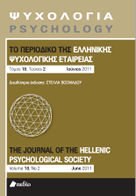Η σεξουαλική εκπαίδευση και τα ψυχοσεξουαλικά προβλήματα ατόμων με νοητική υστέρηση

Περίληψη
Με το πέρασμα των ετών, η πολιτική σχετικά με τις υπηρεσίες και τα δικαιώματα των ατόμων με νοητική υστέρηση έχει περάσει από διάφορα στάδια. Τις τελευταίες δεκαετίες, μοντέλα όπως το σκανδιναβικό μοντέλο της ομαλοποίησης (normalisation) (Nirje, 1972) έχουν βελτιώσει, παρά τα διάφορα προβλήματα, την καθημερινότητα αυτής της ομάδας του πληθυσμού. Σήμερα η πολιτική για τα άτομα με νοητική υστέρηση έχει ως βασικό στόχο να έχουν τα άτομα αυτά κανονικό τρόπο ζωής όπως οι υπόλοιποι συμπολίτες τους. Να ζουν δηλαδή αυτόνομα, είτε με την υποστήριξη της οικογένειας στο σπίτι είτε σε χώρους ημιαυτόνομης ή προστατευμένης διαβίωσης, προκειμένου να αποκτήσουν πιο ενεργό και ανεξάρτητο κοινωνικό ρόλο. Ωστόσο, παρά την πρόοδο και την αυξανόμενη γνώση σχετικά με το φαινόμενο της νοητικής υστέρησης, υπάρχουν ακόμα προβλήματα σχετικά με ζητήματα διαφυλικότητας και σεξουαλικής εκπαίδευσης. Στο άρθρο αυτό επιχειρείται να προσεγγιστούν ψυχοσεξουαλικοί προβληματισμοί, όπως βασικές αρχές σεξουαλικής αγωγής των ατόμων με νοητική υστέρηση. Παρουσιάζονται επίσης ζητήματα σεξουαλικής κακοποίησης και παραβατικής σεξουαλικής συμπεριφοράς εξαιτίας της έλλειψης πληροφόρησης και εκπαίδευσης αυτών των ατόμων.
Λεπτομέρειες άρθρου
- Πώς να δημιουργήσετε Αναφορές
-
Σιαπέρας Π., & Σούλης Σ. .-. Γ. (2020). Η σεξουαλική εκπαίδευση και τα ψυχοσεξουαλικά προβλήματα ατόμων με νοητική υστέρηση. Ψυχολογία: το περιοδικό της Ελληνικής Ψυχολογικής Εταιρείας, 18(1), 73–84. https://doi.org/10.12681/psy_hps.23709
- Τεύχος
- Τόμ. 18 Αρ. 1 (2011)
- Ενότητα
- ΑΝΑΣΚΟΠΗΣΕΙΣ

Αυτή η εργασία είναι αδειοδοτημένη υπό το Creative Commons Attribution-ShareAlike 4.0 International License.
Το περιοδικό ΨΥΧΟΛΟΓΙΑ έχει υιοθετήσει μία πολιτική Platinum open-access. Τα έξοδα υποβολής, επεξεργασίας ή δημοσίευσης των εργασιών καλύπτονται από την Ελληνική Ψυχολογική Εταιρεία. Τα πνευματικά δικαιώματα των δημοσιευμένων εργασιών προστατεύονται από την άδεια 'Creative Commons Attribution-ShareAlike 4.0 International'. Οι Συγγραφείς διατηρούν τα Πνευματικά Δικαιώματα και χορηγούν στο περιοδικό το δικαίωμα της πρώτης δημοσίευσης. Η άδεια αυτή επιτρέπει σε τρίτους, να χρησιμοποιούν την εργασία σε οποιαδήποτε μορφή, με την προϋπόθεση της διατήρησης των διατυπώσεων που προβλέπονται στην άδεια σχετικά με την αναφορά στον αρχικό δημιουργό και την αρχική δημοσίευση στο περιοδικό ΨΥΧΟΛΟΓΙΑ. Επιπλέον, κάθε διανομή της εργασίας οφείλει να γίνεται με τους ίδιους όρους διανομής, δηλαδή με την ίδια άδεια Creative Commons.


